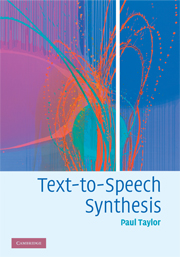Book contents
- Frontmatter
- Contents
- Foreword
- Preface
- 1 Introduction
- 2 Communication and language
- 3 The text-to-speech problem
- 4 Text segmentation and organisation
- 5 Text decoding: finding the words from the text
- 6 Prosody prediction from text
- 7 Phonetics and phonology
- 8 Pronunciation
- 9 Synthesis of prosody
- 10 Signals and filters
- 11 Acoustic models of speech production
- 12 Analysis of speech signals
- 13 Synthesis techniques based on vocal-tract models
- 14 Synthesis by concatenation and signal-processing modification
- 15 Hidden-Markov-model synthesis
- 16 Unit-selection synthesis
- 17 Further issues
- 18 Conclusion
- Appendix A Probability
- Appendix B Phone definitions
- References
- Index
Foreword
Published online by Cambridge University Press: 25 January 2011
- Frontmatter
- Contents
- Foreword
- Preface
- 1 Introduction
- 2 Communication and language
- 3 The text-to-speech problem
- 4 Text segmentation and organisation
- 5 Text decoding: finding the words from the text
- 6 Prosody prediction from text
- 7 Phonetics and phonology
- 8 Pronunciation
- 9 Synthesis of prosody
- 10 Signals and filters
- 11 Acoustic models of speech production
- 12 Analysis of speech signals
- 13 Synthesis techniques based on vocal-tract models
- 14 Synthesis by concatenation and signal-processing modification
- 15 Hidden-Markov-model synthesis
- 16 Unit-selection synthesis
- 17 Further issues
- 18 Conclusion
- Appendix A Probability
- Appendix B Phone definitions
- References
- Index
Summary
Speech-processing technology has been a mainstream area of research for more than 50 years. The ultimate goal of speech research is to build systems that mimic (or potentially surpass) human capabilities in understanding, generating and coding speech for a range of human-to-human and human-to-machine interactions.
In the area of speech coding a great deal of success has been achieved in creating systems that significantly reduce the overall bit rate of the speech signal (from of the order of 100 kilobits per second to rates of the order of 8 kilobits per second or less), while maintaining speech intelligibility and quality at levels appropriate for the intended applications. The heart of the modern cellular industry is the 8 kilobit per second speech coder, embedded in VLSI logic on the more than two billion cellphones in use worldwide at the end of 2007.
In the area of speech recognition and understanding by machines, steady progress has enabled systems to become part of everyday life in the form of call centres for the airlines, financial, medical and banking industries, help desks for large businesses, form and report generation for the legal and medical communities, and dictation machines that enable individuals to enter text into machines without having to type the text explicitly.
Information
- Type
- Chapter
- Information
- Text-to-Speech Synthesis , pp. xxiii - xxviPublisher: Cambridge University PressPrint publication year: 2009
